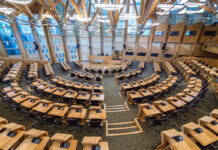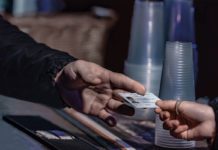Scottish Government’s proposals could face legal challenge
SANDRA White has demonstrated really remarkable tenacity in her crusade against lap dancing clubs.
For over ten years the veteran SNP politician – currently the MSP for Glasgow Kelvin – has tirelessly campaigned for the activities of these venues to be curbed.
As long ago as 2003 she told BBC News: “It’s not a fair way to treat women, to make them take their clothes off for money and have men ogling at them. It’s demeaning and I’m determined to stamp it out”.
After various setbacks in her attempts to get controls onto the statute book, her battle has now been embraced by the Scottish Government in the Air Weapons and Licensing (Scotland) Bill (AWLB).
Ms White’s cause was given a major boost following the appeal court judgment in the landmark ‘Brightcrew’ case.

That decision has been widely construed as imposing severe limitations on the powers of licensing boards – but for those engaged in the war against ‘sexual entertainment venues’ (SEVs) it was manna from heaven.
Three senior judges ruled that Glasgow licensing board had misapplied the law when dismissing a Glasgow lap dancing club’s bid for a premises licence under the Licensing (Scotland) Act 2005.
Put short, the board had been wrong to take into account alleged breaches of a “code of conduct” which had no connection with the sale of alcohol – described as a licensing board’s “essential function”.
That was the perfect justification for creating a separate licensing regime for SEVs, so that those also selling alcohol (no doubt all of the 20 clubs in Scotland) would become “double licensed”, requiring a premises licence from the licensing board and a ‘sexual entertainment venue licence’ from the council’s licensing committee.
The AWLB sets out a very skillfully constructed definition of sexual entertainment: “any live performance, or any live display of nudity, which is of such a nature that… it must reasonably be assumed to be provided solely or principally for the purpose of sexually stimulating any member of the audience”, whether by verbal or other means. And an “audience” could be one person so that private dances in a booth are captured by the licensing scheme.
There’s also a definition of “display of nudity”: broadly speaking, the showing (to any extent) of a performer’s pubic area, genitals or anus; and, in the case of a woman, her nipples.
There’s a problem with definitions. Lap dancing clubs presently selling alcohol under the Licensing (Scotland) Act 2005 will have “adult” (not “sexual”) entertainment set out as an approved activity in the operating plans. But the 2005 Act doesn’t spell out the meaning of ‘adult entertainment’.
There is a definition in late opening regulations – but it only applies for the purpose of conditions to be applied to premises trading after 1am – and it’s much more concise.
In terms of the regulations, ‘adult entertainment’ is a form of entertainment which “(a) involves a person performing an act of an erotic or sexually explicit nature; and (b) is provided wholly or mainly for the sexual gratification of the audience”.
Unless this inconsistency is properly sorted out we can expect bewildering uncertainty as to the types of entertainment which might fall exclusively within the jurisdiction of a licensing board and those which are also covered by the new licensing system.
I said at the beginning of this article that Sandra White’s mission was to “stamp out” lap dancing clubs.
How could a new licensing system achieve that purpose?
Quite easily, because there are no ‘grandfather rights’, and the local authority would be able to determine the appropriate number of venues in its area – a number which could be zero.
As a result, we may see clubs licensed to sell alcohol and provide ‘adult entertainment’ in terms of the operating plan but banned from providing ‘sexual entertainment’.
Expect a rearguard action: there are already suggestions that the Scottish Government’s proposals could face challenges under European law – although the government is confident it can overcome those hurdles.
[hr]
Jack Cummins is one of Scotland’s leading licensing lawyers. Every month he writes on licensing law and answers readers’ questions in SLTN.
[hr]
CLICK TO READ LEGAL Q&A
Do you have a legal question for Jack Cummins?
email sltn@peeblesmedia.com or write to
Legal Clinic; SLTN; Freepost; NATN 478; Glasgow G3 7BR
Jack Cummins is unable to enter into personal correspondence on readers’ questions.
The advice offered in SLTN is published for information only. No responsibility for loss occasioned by persons acting or refraining from action as a result of material contained on this page or elsewhere in SLTN can be accepted by the author or publisher.























